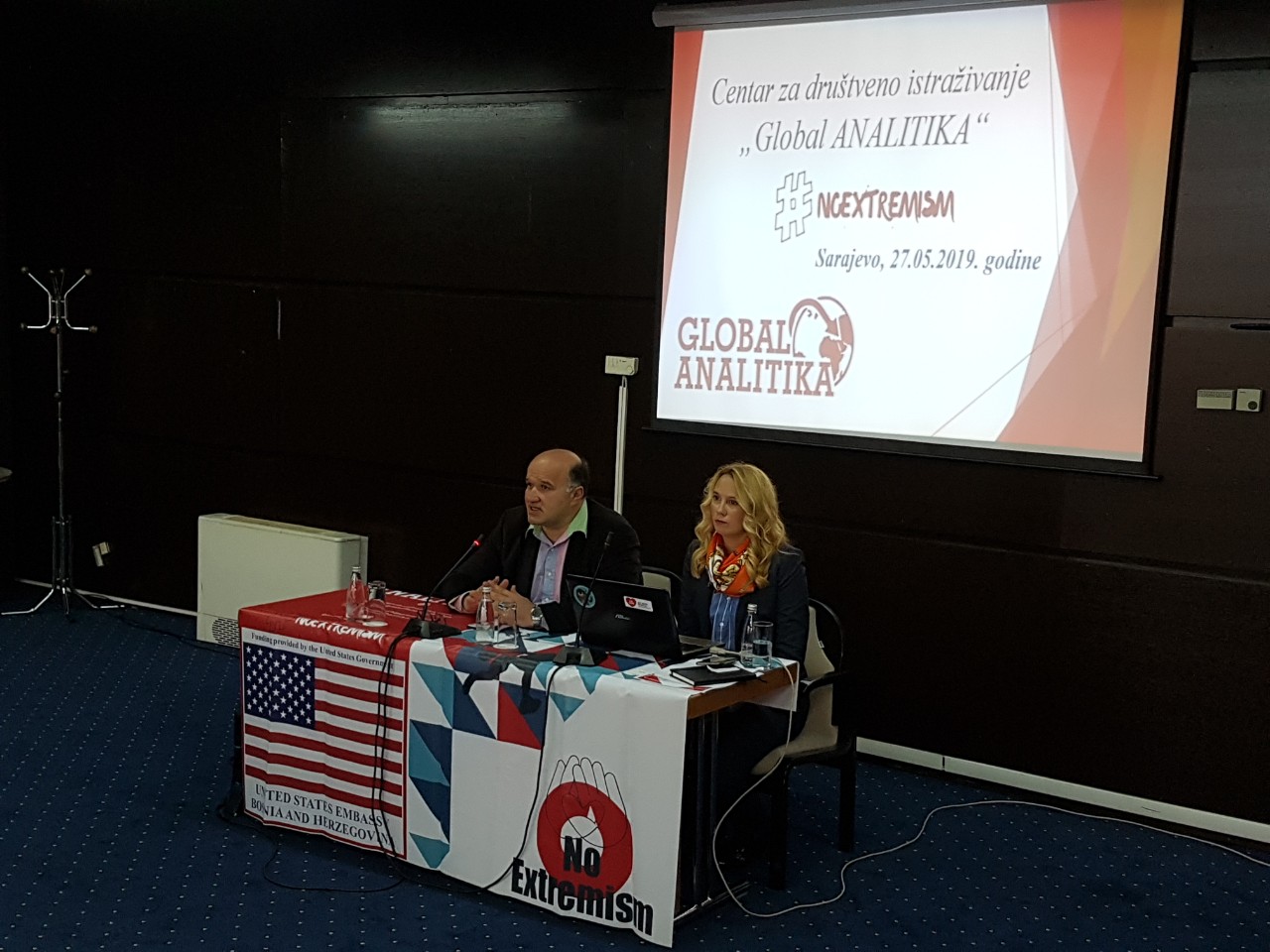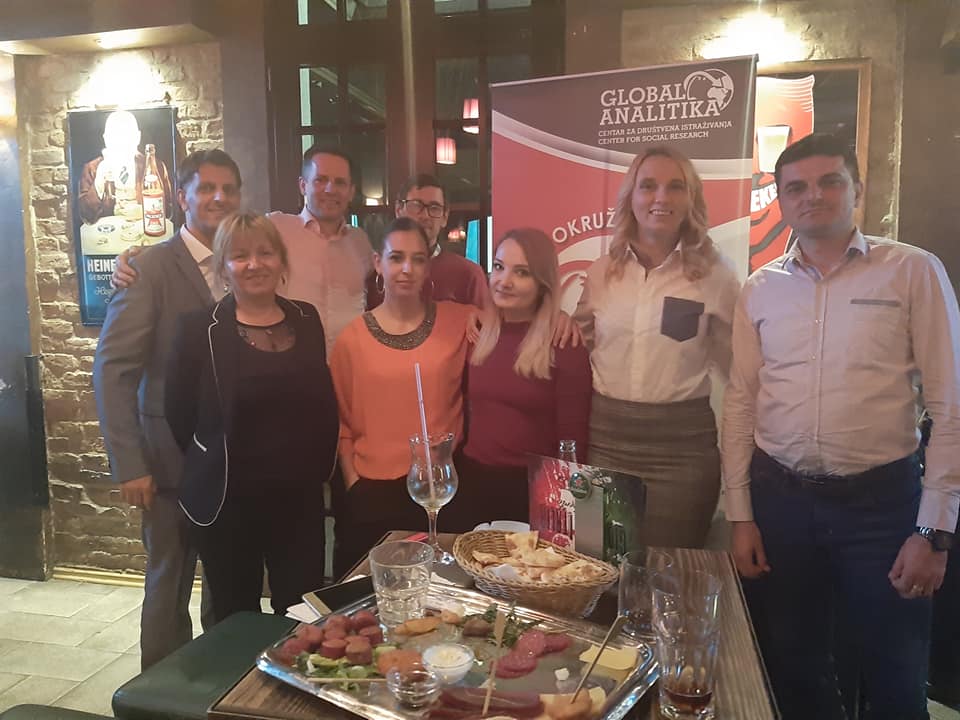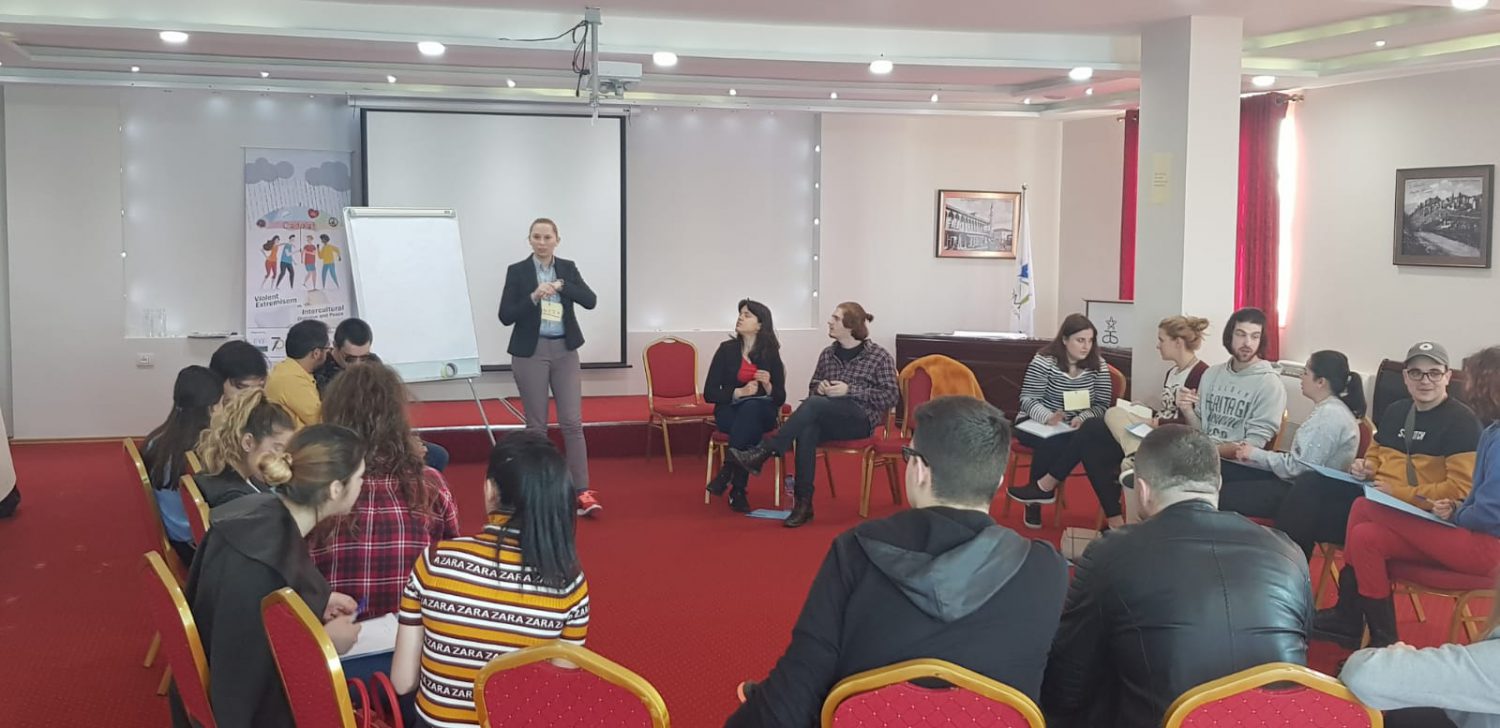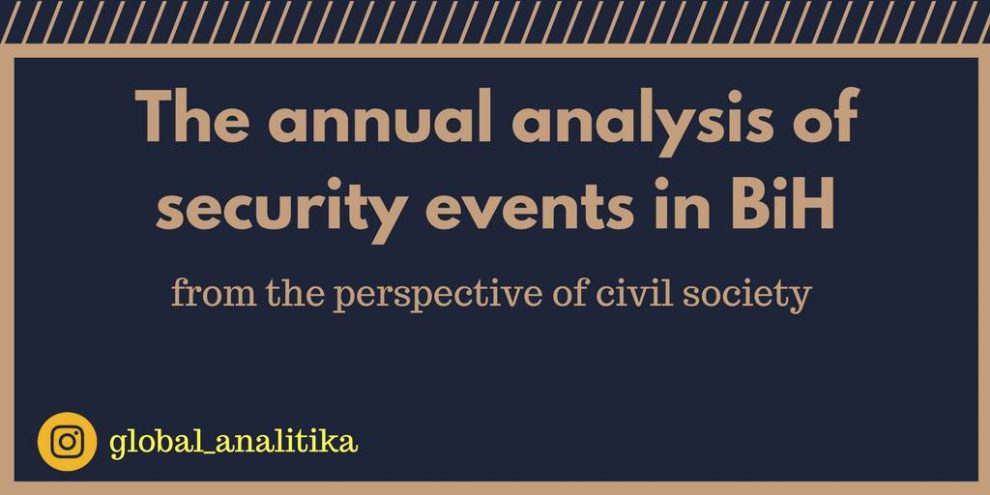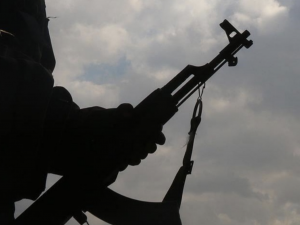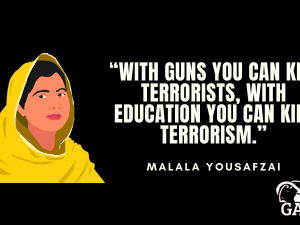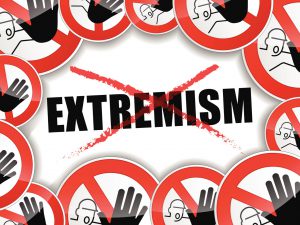Center for social research Global Analitika from Sarajevo is a leading non-governmental and independent organization in BiH and the region in the field of specific security issues, with a focus on working on the issue of violent extremism and radicalism.
The beginning of the new year at work is an opportunity to round up a lot of things done over the past year, that is an opportunity to analytically look at the situation and what has been done, but also to analyze and certain social phenomena and events that were current in BiH. The more diligent ones have already completed their analysis in state institutions and of course planned what to do in 2018, in order to improve the situation in all areas. It is particularly interesting from the perspective of civil society to monitor processes and reforms related to the fulfillment of conditions for EU and NATO accession, and for Global Analitika (hereinafter GA) is a significant part of engagement related to security in all aspects of community functioning. It is interesting to see GA and other civil society organizations that through their own and independent research often give a different picture compared to official information.
Center for social research Global Analitika from Sarajevo, held a regular annual assembly, summarizing and presenting the results of work, and concluded that as an independent research NGO, thanks to the unselfish and professional engagement of all members and associates, have achieved top results. The important thing to note is that practitioners are engaged exclusively at their own request, taking into account the correctness of the mission and the goal of Global Analitika, and in cooperation with the younger forces, they have done a lot to create preconditions for a safer society. Why not point out the fact that all these experts are engaged on a completely voluntary basis, although they often work on complex scientific research projects and works. We are pleased with the achieved results and acknowledgments that arrived in 2017, and in the continuation of the Assembly, it was presented the Annual analysis of security events in BiH from the perspective of civil society. In the shortened version of the Annual analysis of security events in BiH, which is regularly produced by Global Analitika, a review is given of some current social phenomena that have influenced or could affect the security situation in BiH. Global Analitika’s expert team (composed of practitioners and academic researchers) has compiled a List of Security Challenges (LSCs) for 2017, which are specific for monitoring in order to observe security issues from the perspective of civil society and independent researchers.
LSC for Bosnia and Herzegovina:
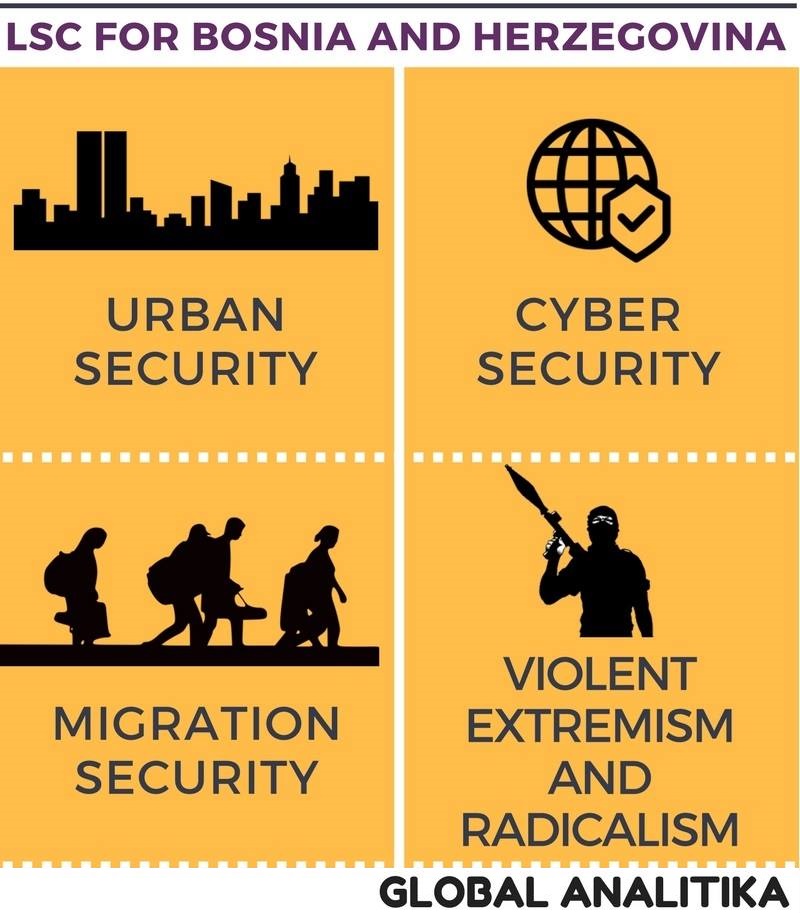
In the annual analysis, among other things, issues were addressed according to the opinion of citizens and representatives of civil society, how did state responsible structures reacted in the prevention and countering security threats, what is the quality and impact of the measures taken, how much and how can they help the community and civil society in raising the level of general security.
URBAN SECURITY
EFUS (European Forum for Urban Security) is a network that was created 25 years ago and consists of 250 members, cities, regional governments, institutions and various organizations dealing with crime prevention and work on developing urban security policies. These organizations come from 15 European countries, and in 6 countries there are national forums (Belgium, France, Germany, Italy, Spain, Portugal). EFUS put the following elements into the security risks and forms of crime: mass violence, family violence, gender violence, hate crime, organized crime and human trafficking, radicalization, crimes of passion, narco-crime, terrorism.
At the state level in BiH, the concept of urban security is not so much in use, and urban security is not considered as much as in the EU nor it is part of systemic security measures taken by police agencies. When the urban security in BiH is viewed from the perspective of civil society, it is not at a satisfactory level, primarily due to everyday examples of committed criminal acts and violence. Another reason for this assessment is the fragmentation and non-systemic binding of the security apparatus in BiH. Therefore, we do not have a uniform and standardized data for certain security risks and criminal acts, as well as the incompatibility of policies and forms of reporting on security issues, leads to the fact that BiH does not have adequate statistical but also operational information on urban security. Compared with the communities in our surrounding, urban security in BiH indicators of the level of general crime, as well as by factors of security risk is roughly at similar levels, but the functioning of the security apparatus in the states of the environment is much simpler. When comparing urban cities in EU countries with cities in BiH, it is evident that there is a different technological and organizational approach to police activities in the first place, leading to a 25 percent increase in solving heavier crimes committed in EU countries. Regarding the role of the local community as well as civil society, in cooperation and support to the police structures, it is much more pronounced and more effective than in BiH due to the planning of financial resources for the local community for this purpose. Also, the historical context and current global trends in the domain of security threats have determined policies and programs of the relevant security agencies. So we could see, for example, in the elimination of the consequences of terrorist attacks in EU countries, local police forces had a leading role in the field in cooperation with the local community and its resources.
Urban security, according to Global Analitika’s experts, includes various types of violence, from hooliganism, domestic violence, juvenile violence, and various forms of crime such as organized crime, human trafficking, etc. Taking into account the reports of the competent police agencies, as well as reports by international organizations that monitor these issues, it is evident that there is still plenty of room for improvement in the work of security structures, and there is insufficient cooperation between the local community and the police. In some situations, the response and procedures regarding the handling and jurisdiction of police agencies have affected the quality and speed of the operation of police forces. The data indicate that the inadequate structure of police agencies concerned with public safety is one of the main reasons for this assessment. Police cooperation between all levels of the complicated security apparatus in BiH is, despite political and organizational barriers, at a satisfactory level, especially when it comes to acting in cases of more serious forms of crime. It is also evident that the police forces in charge of public security advocate and work in the field, furthermore they act in accordance with the applicable legal regulations, which, unfortunately, are not harmonized with EU standards. The mitigating circumstance for some procedural failures is that police officers are not adequately equipped or paid for the honest and stressful work they do, yet it cannot be said that they are irresponsible and unprofessional in carrying out day-to-day planned as well as more complex police tasks.
CYBERSECURITY
Cybersecurity is a field that is not adequately treated through security structures at all levels in BiH, and the main cause is that BiH is still technologically lagging behind the EU countries and the West in general. From the security point of speaking, is a huge handicap that BiH is not an EU member, and therefore not EUROPOL, which gives enormous attention to cyber safety and cyberspace. So for Europol members, if nothing else, they have access to the latest information and achievements in the field of protection against cybercrime. Security cyber experts from EU countries participate in joint training, investigative actions, operational actions, scientific cooperation, staff exchange and other activities. From the state level in BiH, the problem of cybersecurity is recognized, as well as partly by the entity Ministries of Interior Affairs, and they are trying to provide space for improvement of this area through the development of strategy and other policies, but it is more difficult for following reasons to follow the trends and standards of contemporary country.
MIGRATION SECURITY
Migration security is a challenge that, depending on global movements, reflects, to a greater or lesser extent, on the state of security in BiH. The second half of 2017 is particularly burdened by the increased trend in migrants’ attempts to transfer across the territory of BiH to EU countries, which greatly strengthened smuggling and this type of criminal activity. In the illegal transfer of migrants, through so-called. The Balkan route, are being included already non-organized smuggling groups and individuals who were active in drug trafficking, (mostly skunk), high-tariff goods, as well as weapons. However, smuggling of migrants is becoming more profitable, and in the opinion of smugglers as less risky crime, because for example, from Bileca to Mostar it is being charged a minimum of 100 euros per person. In this smuggling of migrants, they are often deceived or even robbed, which is very difficult to prove. According to current indicators, this trend of using BiH territory for the movement of migrants towards EU and Western European countries will continue in 2018, and it is up to BiH authorities to draw up adequate multisectoral plans and measures to combat this phenomenon as soon as possible.
VIOLENT EXTREMISM AND RADICALISM
A special accent in the Annual Analysis of Security Events in BiH, from the perspective of civil society, was given to the current issue of violent extremism and radicalism. Why is this security challenge so complex and dangerous?
The simplest answer is for the reason that it can lead to terrorism. Unlike some of the other elements of the List of Security Challenges created by Global Analitika, the issues of violent extremism and radicalism were initially seriously addressed, both by the state security structures of BiH and the judiciary of BiH. Security agencies at the BiH level are a relevant factor in international cooperation when it comes to the exchange of intelligence information, but also the undertaking of intelligence-operational actions on the territory of BiH, according to the requests of the most famous international security agencies and organizations. The planned measures and activities, as well as timely elaboration and action of responsible factors in accordance with the adopted Strategies for fight and prevention of terrorism, resulted that in 2016 and 2017 were no acts recorded that could be related to terrorism, nor there were recorded new cases of joining BiH citizens to some of the terrorist organizations in the world. The BiH Strategy for Prevention and Fight against Terrorism 2015-2020 has four sub-goals, and the first is Prevention of Hate crimes, Radicalism and Terrorism in all forms. In the part of the Strategy relating to the role of civil society, the following is defined: To support the activities of citizens and civil society organizations aimed at preventing hatred and promoting positive narratives (opposing violent extremist narratives by highlighting positive examples of social values, tolerance, openness). Exactly on these guidelines Global Analitika base its activities and seeks to give maximum contribution in preventing and strengthening resilience, especially for young people, to the still present possibility of radicalization. For the more effective action of CSOs and other factors involved in the Strategy, further research on this phenomenon is needed, as well as insisting on the correct and lawful reporting of the media on violent extremism and radicalism.
A research study conducted at the end of 2017 showed that radicalization of the state and individuals can be influenced by hate speech present in the media and social networks. This was especially emphasized in the period after the recent judgments of the International Court of Justice in The Hague when the media space in BiH and neighboring countries was completely possessed by constant hate speech. The ragging of politicians, unprofessional journalists, party media, and journalists, as well as individuals to insult others as much as possible, as to offend religious and national feelings, has reached a staggering level. Unfortunately, young people in the social networks succumbed to the general media campaign, and the worst insults and comments, the invocation of the war past, calls for new killing, and so on, could be seen. The above example clearly shows how much BiH is still an unstable area, susceptible to negative influences, and even the effects of extreme ideologies. Radicalization and self-radicalization via the Internet in BiH is also possible, as the fact that online radicalization is not particularly addressed through legal regulations in BiH, which was stated in the research paper entitled “Online radicalization – the security challenge that endures”, published within the Third International Conference in Sarajevo, organized by the International University of Sarajevo.
However, a lot of this has been done in a positive way in the prevention of violent extremism and radicalism in BiH, thanks to the clear commitment of BiH institutions, as well as the support of international organizations operating in BiH. What is especially important for adequately opposing and preventing the appearance of violent extremism and radicalism, emphasizes one of the experts of Global Analitika’s expert team (Mladen Blagovčanin, a police investigator with more than 20 years of experience) is that this problem should be primarily dealt by experts. Which implies that these experts are professionals with experience in police and security structures, then with experience in social and health institutions, and scientists and independent researchers. They should be those who best understand the dangers of a radicalized individual or group, because they deal with it on a daily basis, with excellent knowledge of the climate, history, people, religious and other customs as well, and therefore their assessments are very important. Engagement of other experts is also necessary, but in the second phase, when there is a bigger need for experts with theoretical knowledge, in order to develop multisectoral cooperation and implement planned measures.
According to a survey conducted by Global Analitika and other organizations dealing with the topic of community security in BiH, the level of urban security in 2017 was similar to that in 2016. Although the most of the police analysis and reports compiled by the cantonal and entity Ministries of the Interior Affairs, as well as the BiH Ministry of Security say that in 2017 there was a slight decrease in crime compared to the previous year. The surveys that we have realized with citizens throughout BiH show that citizens don’t see a big difference compared to 2016, and generally don’t feel safer.
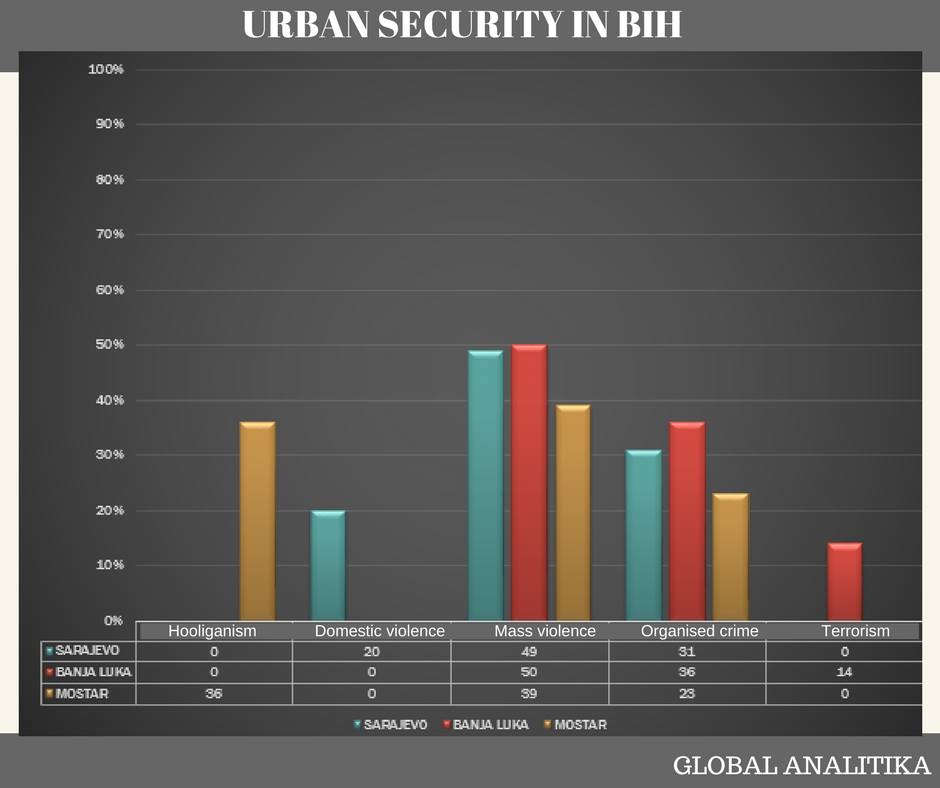
The survey conducted in Sarajevo, Banja Luka and Mostar, on 550 respondents, showed that citizens similarly perceived dangers and security threats. Thus, when asked to select the three most dangerous elements of urban security in all three cities, most citizens responded that they have the greatest fear of mass violence, then organized crime, while the third item is different in all 3 cities. Citizens in Sarajevo believe that third place is domestic violence from the elements of urban security, third place in Banja Luka is fear of terrorism, while in Mostar, third place is fear of hooliganism. The results of the research, apart from saying that the environment and surrounding influence the opinions of people, it is evident that the media has the greatest influence on the public attitudes, which, for their reasons, emphasize certain topics and information, thus creating and influencing the opinion of the public. For this reason, the results of the survey in these three cities are also different.
For Global Analitika in 2018 it is expected the continuation of engagement in the prevention of all phenomena related to violence, the prevention of hate, the continuation of independent research of all social phenomena that can radicalise the state in BiH, the promotion of media professionalism and sensibility in reporting about violent extremism and radicalism, pointing out the dangers of online radicalization, and the strengthening of the resilience of youth and community to all forms of extreme and radical action.
We hope that the tireless work and dedication of our organization will motivate other organizations, institutions, and individuals to engage more seriously in activities that lead to the creation of a safe living space in accordance with EU standards. It is also important, and we expect that achieved results of the work of Global Analitika will be recognized and supported by national, as well as international institutions.




